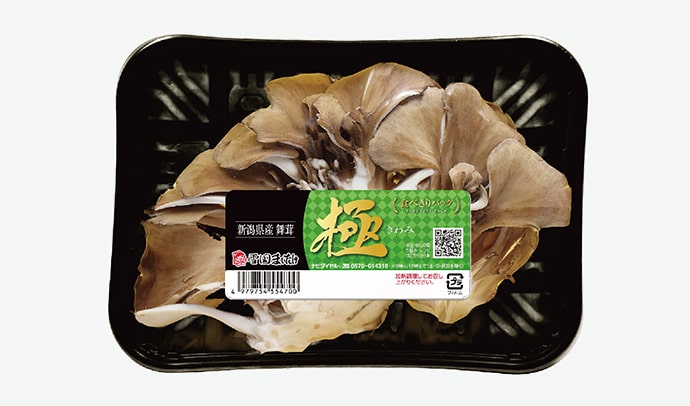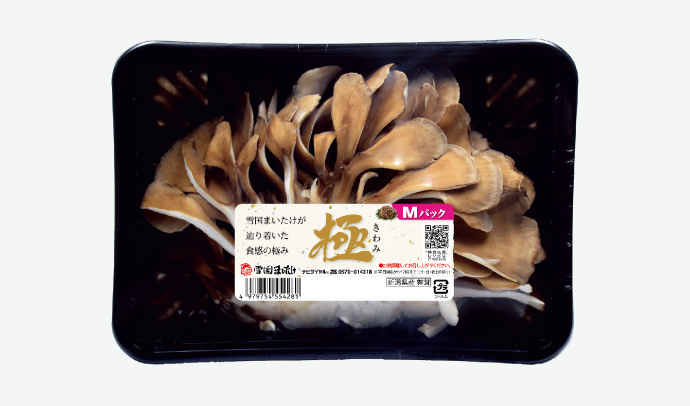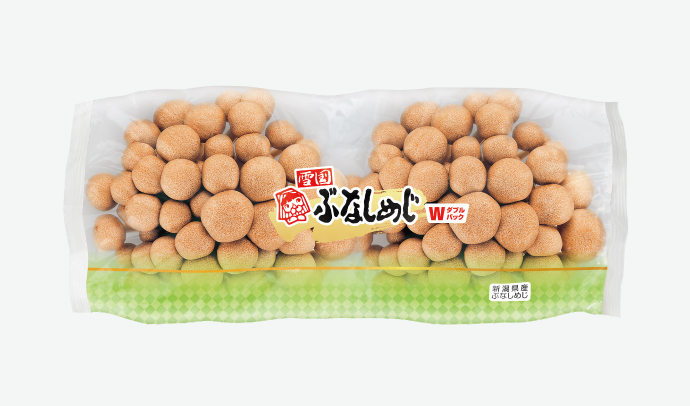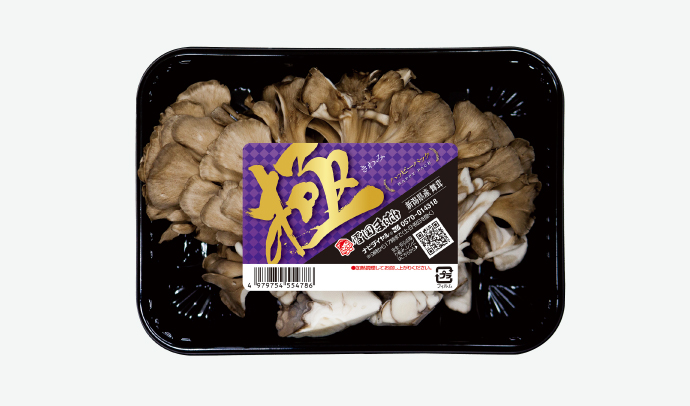Policies and Strategies
Mushrooms are cultivated using a culture medium made from wood or other plant-derived materials such as ground sawdust.
Yukiguni Maitake reuses the mushroom culture media after harvesting as fuel for boilers and others in order to reduce waste. We also utilize the steam produced by boiler combustion for mushroom production in order to reduce energy consumption and make effective use of resources. In addition, we do not use hazardous substances that could lead to water pollution in our mushroom cultivation, so we consider our risk related to environmental pollution is low.
The Group contributes to the realization of a sustainable society by making effective use of limited resources and engaging in activities that could lead to the reduction of environmental burdens, such as waste and environmental pollution.
Structure, Governance and Risk Management
For details, please see Sustainability Management Structure
Indicators and Targets
The Group has set the following indicators to reduce waste and prevent environmental pollution.
| Scope | Unit | FY2020 | FY2021 | FY2022 | FY2023 | Target | |
|---|---|---|---|---|---|---|---|
| Recycling rate* | non- consolidated |
% | 66.5 | 64.1 | 66.0 | 66.6 | - |
| Total waste weight | non- consolidated |
t | 4,097 | 4,034 | 3,976 | 3,859 | - |
| Nitrogen oxides | non- consolidated |
t | 223.36 | 224.85 | 213.43 | 230.31 | - |
| Sulfur oxides | non- consolidated |
t | 49.79 | 44.42 | 31.02 | 26.91 | - |
| Hazardous waste | non- consolidated |
t | 0 | 0.029 | 0.011 | 0.06 | - |
| Volatile organic compounds | non- consolidated |
kg | 0 | 0 | 0 | 0 | - |
| Environment-related fines | non- consolidated |
millions of yen | 0 | 0 | 0 | 0 | 0 |
- * Calculations are based on all wastes for which reports on industrial waste control documentation have been submitted.
Initiatives
Initiatives to Reduce Waste
Utilization of culture media
For mushroom cultivation, culture media made from plant-derived materials, such as sawdust made by grinding wood and other materials, is used. At Yukiguni Maitake, we use the culture media after use as fuel for biomass boilers in order to reduce waste. By using waste culture media as fuel, the use of fossil fuels can be reduced. These initiatives therefore lead to a reduction in greenhouse gas emissions.
Lightweight trays
At Yukiguni Maitake, we have been working on reviewing our tray materials in order to contribute to waste reduction through the use of lightweight trays.
In FY2021, we realized a weight reduction of approximately 16% for the “Maitake Kiwami Tabekiri Pack” tray, 22% for the “Maitake Kiwami M Pack” tray, and 11% for the “Yukiguni Buna-shimeji W Pack” tray.
This means that a total of approximately 153.2 tons of plastic has been reduced in calculation*.
In addition, in FY2022, we also changed the materials of trays for products such as “Maitake Kiwami Happy Pack.” As a result, we realized a weight reduction of approximately 12% per tray.
* Compared to the amount procured in FY2022, the weight of the trays before and after the material change.




Utilization of Recycled Trays
We use 100% recycled trays*1 for our mushroom products. We have confirmed that the raw materials used for our trays conform to the “Standard Specifications for Apparatus or Containers and Packaging Made of Synthetic Resins” and “Industry Voluntary Standards*2”, and thus, we are working to reduce environmental impact while ensuring food safety.
- *1. Results for Yukiguni-Maitake in FY2022. They include the reuse of scrap materials generated at plants manufacturing trays in addition to recycled raw materials generally collected.
- *2. They refer to the Center for Food Contact Material Safety, Japan Chemical Innovation and Inspection Institute, and the Positive List System for Apparatus and Containers/Packaging for Foods.
Reduction of Food Losses
We are working on the reduction of food losses. At our plants, we use the offcuts produced when cutting mushrooms for processed products such as boiled mushrooms in water. In addition, we have adopted packaging materials with high freshness retention in order to prevent waste during the distribution process.
All parts of most of the mushrooms produced by Yukiguni Maitake are edible. Therefore, almost no waste is generated by consumers, including households.
In order to ensure that our maitake mushrooms can be eaten up even more deliciously, their packages also contain the information that their stems are also edible and instructions on how to store them at home.
Efforts to Prevent Environmental Pollution
Control of Environmental Pollutants
We comply with laws and regulations related to the prevention of environmental pollution, and our Risk Management Committee establishes policies and measures related to environmental pollution risks for each fiscal year on an annual basis to implement ongoing management of wastewater, soot and smoke, CFCs (chlorofluorocarbons), waste, and others from our plants.
Air Pollution Prevention Initiatives
We are currently promoting the conversion of the fuel used in our cultivation centers to liquefied natural gas (LNG). LNG is a clean energy that contains almost no impurities. Therefore, in addition to producing less CO2, it also produces less NOx and does not produce SOx or soot and dusts.
Cultivation without the use of any pesticides
All of our mushroom products are produced at facilities for cultivation and are free from any pesticides, which are said to have a high environmental impact.
Initiatives to conserve water resources
Recycling of water resources
For details, please see Sustainable Use of Water Resources
